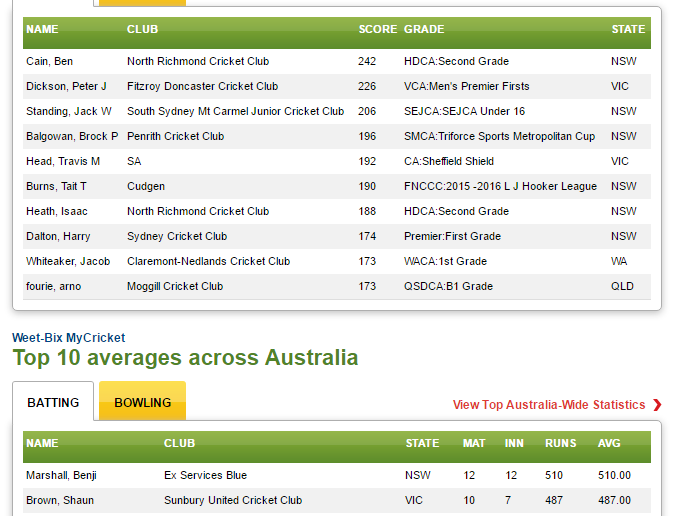Our purpose at the Australian Cricket Institute is to develop not only good players but also good people and complete cricketers with good habits, behaviours and skills on and off the field.
To become better on the field you must become better off the field.
Easy said, but how do we go about doing that?
By using an approach that we’ve developed called the ‘4 Pillars Of Success’
After years of being involved in the trenches as both coaches and players…
Studying elite players, exactly what they do and why they do it.
Coaching young players, watching them develop and studying why some develop faster than others…
We’ve simplified success in cricket down to focusing on four pillars.
And we’ve discovered that those who actively work on improving all four pillars more often than not see higher levels of success than those that don’t.
Let’s take a look at what the 4 pillars are and how you can improve in each area to start seeing massive results on and off the field.

The four pillars: Technical, Physical, Mental and Tactical.
Let’s take a deeper look into each pillar…
PILLAR #1: TECHNICAL
Probably the most obvious pillar and the one that most people spend the majority of their time developing. Most players, coaches and coaching programs spend time developing ONLY this pillar, which is a mistake and you’ll learn why.
What is the technical pillar?
It’s your skills and your technique. Hitting balls, catching balls, bowling balls.
Out swing, in swing, wrist position, high front arm, elbow up, foot to the ball - all the things you’ve heard before.
All hugely important.
You must have good skills and a technique that works to be successful in cricket.
But for two reasons…
1. Because a lot of coaches underestimate the learning power of children and how much information they can actually absorb.
2. Because most coaches only know the technical pillar. They fail to educate themselves, up skill and practice what they preach in the other 3 pillars (don’t get me wrong, it’s not easy, but it’s necessary).
The majority of juniors will only ever be exposed to the technical pillar unless they reach a really high level in youth cricket, only then will they be exposed to the other 3 pillars.
That’s too late.
Why not start developing all four pillars as early as possible? That’s how you create quality athletes on and off the field.
I believe we don’t give young players enough credit and often dismiss concepts as being “over their head”.
Why can’t a 12 year old learn how to effectively visualise and to replace negative thoughts with positive thoughts while they’re out in the middle?
Or that replacing bad carbohydrates and sugars with fresh food and protein is going to give them more energy, make them stronger and healthier and help them think with clarity and concentrate for longer?
I can tell you from working first hand with thousands of young players that children listen to, retain and apply what you teach them a lot better than adults.
They’re a blank slate waiting to learn.
Let’s not underestimate them.
[Rant over]
Now how do we go about helping a player improve technically?
Four things…
SELF REFLECTION
A huuuuge focus in our programs. The faster a player can gain an understanding of their game, their strengths and their weaknesses, the faster they will develop.
To gain an understanding of their game they actually have to spend time thinking about it.
The way we do it is by asking two simple questions after every session.
1.What did you do well that session?
2.What do you think you need to improve on out of that session and how are you going to do that?
SPECIFIC PLANS
From that self reflection we then help players create specific plans on how they’re going to improve that part of their game.
E.G. “I was hitting my drives in the air a lot because my weight was back and I was too early in my shots.”
Ok how are you going to specifically improve on that?
“I’m going to get to training early every day this week and spend 15 minutes on the bowling machine doing the circle drill and focus on getting my weight forward and hitting the ball as late as possible.”
REPETITION
Drills are key to repetition. And repetition is key to skill development.
We create environments where players can work on specifics for long periods of time.
The standard 10 minute bat in the nets at club training doesn’t allow that so players have to get repetition in in their own time.
OUTCOME BASED LEARNING
Too many coaches get caught up in the ‘how’ (elbow here, front foot here, head there) rather than the ‘what’ (the result).
Players are going to have different techniques and ways of getting the result, which in the end is all that matters.
A coaches job is to help a player discover what works best for them.
If you give them an outcome, they’ll figure out how to get the result in the best way that works for them.
We create drills, environments, scenarios that allow players to focus on the result.
If they’re getting results and their technique is sustainable (not causing any harm to their body), that’s all that matters to us.
If your child would like to improve technically over the winter, our academies can help them do that…
Ok, onto the next pillar...
PILLAR #2: PHYSICAL
Why is the physical pillar so important?
Because to execute your skills and maintain concentration for a long period of time you need to have endurance, strength, power, flexibility, agility, speed and energy.
To develop those skills and attributes you need to follow effective strength and conditioning, stretching and nutrition programs.
Here’s a few simple tips on how you can improve (or help your child improve) physically…
FITNESS
- Focus on the engine - legs, gluten and core.
- Break your year into blocks and focus on specific outcomes. E.g. Strength, power, endurance, speed maintenance.
- Do work that’s going to improve your cricket, not make you look good.
INJURY PREVENTION
- Stretch regularly
- Cricket specific training
- Make warming up a habit before training and playing (dynamic)
- Recover properly (stretch, walk/jog, water therapy, right nutrition, water)
NUTRITION
- Eat fresh
- Prepare your own food
- Hydrate - min 2L a day
- Avoid nasties like sugars, complex carbs, bad fats. (commercial sports drinks suck!)
If your child needs help getting themselves physically prepared…
PILLAR #3: MENTAL
The thoughts in your head play a HUGE role in the actions your body takes and the way that you execute your skills.
Nerves, fear, pressure.
None of them are real.
They’re all emotions created by the thoughts in our head. Which we’re 100% in control of once we understand how to be.
I think it’s often overlooked how much of a role our mental skills play in cricket.
There’s so many components within the mental pillar, but the one thing that will make the biggest difference to a players game is self talk.
What you’re telling yourself the night before a game, the morning of a game and during a game whether you’re batting, bowling or fielding.
So many players are riddled with negative self talk…
“What if I get a duck tomorrow?”
“I’m playing that batsman who smacked me all around the park last time”
“This guys’s too quick for me”
“The wicket is a shocker”
“What if I get out now”
“What if I go for 8 this over and let the team down”
“The run rate is getting too high.”
All thought’s that create those little gremlins we call nerves, fear and pressure.
How do we turn those emotions into positive ones?
Confidence, excitement and conviction.
By turning negative self talk into positive self talk.
“I’ve trained hard and feel great so I’m confident of getting 50+ tomorrow”
“I’m bowling really well now so I’m looking forward to another challenge with that gun batsman.”
“I’ve faced faster bowling on the machine, this guy’s going to be easy”
“I’ve trained on a wicket like this so I’ve got the perfect plan”
“Concentrate and watch the ball, I’m seeing it really well”
“This guy’s stronger on the leg side so I’m going to bowl wide of off and go for less that 5”
“We’ve still got this 42 balls left which is a lot of scoring opportunities, wait until it’s in your zone”
Our thoughts control our emotions and our emotions control our actions.
5 simple things you can practice to improve mentally…
JOURNALLING
Similar to self reflection it gets you to stop and actually think about your thought’s, feelings and emotions.
Write them down every day and think about what caused them.
POSITIVE SELF TALK
Easier said than done but get into the habit of being aware of when negative self talk is creeping in.
Acknowledge it. Put a stop to it and replace it with something positive.
Like all things it take practice, the more you do it the more it will become habit.
VISUALISATION
Whatever the mind see’s it will believe.
Visualisation also creates familiarity, the feeling of having been there before and thing’s we’re familiar with we’re comfortable with.
It’s a whole new topic so I won’t go into it but learn how to visualise.
STRENGTH BASED PLANS
Whether you’re batting, bowling or fielding, create plans around your strengths.
Walking out with a clear plan will fill you with so much more confidence than having no plan at all.
To create strength based plans you need to have an understanding of your strengths and weaknesses.
This is where self reflection and journalling comes in.
Can you see how it’s all staring to tie in?
BREATHING
If all else fails and you still can’t control your negative thoughts, revert to focusing on your breathing.
Long and slow in….long and slow out. (If you want the exact technique email me: nick@australiancricketinstitute.com)
Focusing on your breathing clears your mind and centres your thoughts.
If you would like us to coach your child and teach them a set of mental skills that will help them on and off the field for the rest of their lives…
PILLAR #4: TACTICAL
If you don’t know when and how to use them, having the skills will only get you so far.
Having the ability to read the conditions, the opposition, the situation of the game and being able to develop a plan to best suit that particular scenario is a skill.
It’s a skill call tactical ability and game awareness.
And the best players in the world have plenty of it.
Here’s how we help players develop tactical and game awareness.
SCENARIOS
Every net session we run is a scenario.
Whether it be runs, wickets, run rate, singles, boundaries…we give the batsmen and bowlers a target.
We get the bowlers to set fields and we have the coaches go away with the batting and bowling group and facilitate them creating plans for that particular scenario.
We get comments from players like “I actually found myself in that situation in a game and felt like I’d been there and done it before.”
Tick.
CONVERSATIONS
I’ll revert back to self reflection and the example above. We encourage players to tell us, not us telling them.
What they plan to do.
What they did well or not so well and why that was so.
Conversations promote learning.
EXPERIENCE
Often times the quickest way to develop game awareness is though experience.
Play as much as you can and watch as much cricket as you can.
And when you watch take note of what the captain is doing in the field, the way the batsmen are approaching the game and think about why they’re doing it.
SENIOR PLAYERS
Watch them, follow them, train with them and ask them questions.
As I Said above, game awareness develops with experience which senior players have got.
Whether a senior player to you is 16 or 35, find someone you respect and learn from them.
There’a a lot of information to digest there but can you see how each pillar ties in with the next and the four of them work together like a well oiled machine?
Neglect one pillar and the other three won’t operate as they should.
Hopefully that gives you a good understanding of our philosophy at the Australian Cricket Institute and you can see how all four pillars compliment each other.
If you’d like more information about our face to face coaching programs that we offer for girls and boys aged 12-19…
Author: Nick Fitzpatrick
Australian Cricket Institute Co Founder and Head Coach








